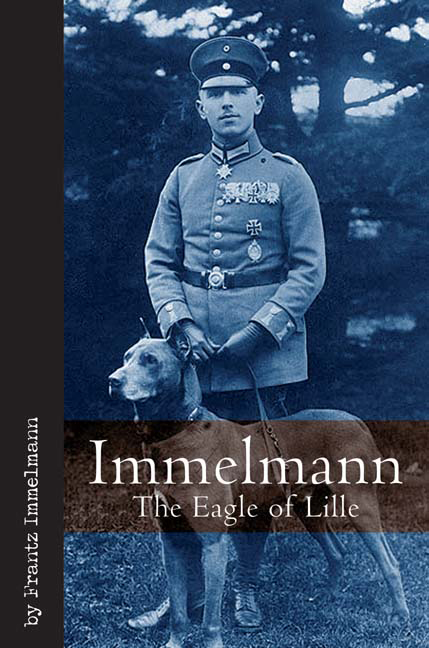

This edition of Immelmann: The Eagle of Lille is published in the United States of America in 2009 by
CASEMATE
908 Darby Road, Havertown, PA 19083
and in the United Kingdom by
CASEMATE
17 Cheap Street, Newbury, RG14 5DD
 A Greenhill Book
A Greenhill Book
Copyright 1990 & 2009 Lionel Leventhal Ltd
Appendix Norman L. Franks 1990
Typeset & design Casemate Publishers 2009
ISBN 978-1-935149-76-7 / 978-1-932033-98-4
Cataloging in publication data is available from the
Library of Congress and the British Library.
All rights reserved. No part of this publication may be reproduced, stored in a retrieval system or transmitted, in any form or by any means, electronic, mechanical, photocopying, recording or otherwise without the prior permission of the publishers.
Printed and bound in the United States of America
Publishing History:
Immelmann, The Eagle of Lille was first published in German as der Adler von Lille by K.F. Koehler Verlag, Leipzig in 1934. The first English edition was published by John Hamilton in 1935 or 1936. It was reissued in facsmile by Greenhill Books / Lionel Leventhal Ltd in 1990 with a new appendix by Norman Franks. This new edition has been completely retypeset but the original language has been left unaltered.
Contents
I |
ChildhoodSchool and Cadet DaysThe EnsignStudent Days
|
II |
The Outbreak of WarMobilisation and Garrison DutyFirst FlightsThe Flying SchoolFirst and Second TestsThe First CrashThe Aircraft ParkThe Third TestsAn ExperienceThe Front at Last!Artillery Flier in the Champagne Flying Section 62, the New HomeAffection and LoyaltyThe Formation of Flying Section 62 The Youthful German Air Arm; a SurveyThe Development of the Air ArmReconnaissances on the SommeThe First AirfightTo Arms! Progress and SuccessLost!Long Distance ReconnaissancesThe First Scouting Flight and the First VictoryImmelmann the First Scout The Biplane Fighter and the Fokker One-seater FighterImmelman and BoelckeThe Fokker Becomes KnownThe Second VictoryFront and HomeThe Third VictoryAn Excursion and a Rough LandingDays of Heavy FightingThe Fourth VictoryThe Fifth VictoryModesty Pioneers of the Air ArmAerial Supremacy
|
III |
The Sixth VictoryHonoured by the King of SaxonyLeaveThe SeventhA Visit to BrunswickThe Fokker Turns TurtleThe SeventhThe EighthThe Pour le Mrite ChristmasSuccess and ComradeshipRumours and LegendsThe NinthA Double Event: the Tenth and EleventhThe TenthThe Eleventh Questions and AnswersThe TwelfthThe ThirteenthThe Emperors LetterImmelman and the 13The FourteenthOn the Active List Again and Full LieutenantSevere Fighting in the AirOne Year of Flying Section 62The FifteenthPopularityThe Last WeeksShot Down by His Own GunThe Beginnings of Formation FlyingA Premonitory FarewellThe First Combats on the Last DayThe Last Fight and the Last VictoryThe End
|
Introduction
When we airmen climbed out of our cockpits after our final front patrols in the gloomy days of November, 1918, only very few of us realised that those were the last flights we should ever make; also that for long, long years the Treaty of Versailles would leave us nothing but memories and longings. The longing for the vast expanse of the air was destined to become almost a torture to us at times when we gazed at the blue sky and watched one of the few German airmen careering in and out of some particularly beautiful cumulus cloud.
Then, in the hard struggle for existence, our longings were lulled to sleep.
Our ancient longing for the air is awake once more. And soimpelled by this longingfor some time past I have been looking through the souvenirs left to me from the days of my Great War experiences. Quite unexpectedly I put my hands on a packet of lettersthe letters written by my brother Max to our mother during the war.
I dip into them, and suddenly a vision rises up of the glorious days when we could fly and whensince we were war airmenwe could gain our own experience of the war which, despite Staffel and Squadron patrols revealed itself to us only in the way in which my brother Max saw it in his first combat patrols as a knightly duel between two evenly matched opponents. Was it the war we loved, or the flying?
In my opinion it was the flying. Whence, else, comes that last vestige of longing we feel today when we hear a propeller humming in the blue of heaven?
Faded press cuttings recall those days and our common experiences in them. Yes, it was a happy, youthful, vigorous life we led then, and it brought my brother Max to the highest military fame and to the greatest and most genuine popularity. And was he not fortunate also in his end, since Providence summoned him away from this earth at the height of his popularity, when he was still the unconquered ruler of his airy domain and the Eagle of Lille? That name was given to him in esteem and admiration by his opponents in the trenches on the other side of the line.
He was likewise fortunate in that he was spared witnessing the bitter end. He remained ever a true believer in the German ideals, and it was fortunate for him that he was not forced to experience the unworthy and unnecessary selfabasement of those men of November, 1918, the odious selfmutilation of his compatriots and the inexpressibly wearisome fourteen years of Germanys decline.
I think on the days of youth which we shared. Then I rummage in mothers desk and find some carefully guarded treasures therethe youthful letters of her eldest sonchildhoods memoriessouvenirs.
And it is not merely the kindred nature which now takes such strong possession of me and reveals my better self to me. No, it is the fact that something which has been buried now emerges to my view. I see the portrait of a true German, who was unrestrainedly proud of being a German.
But at the same time I realise with some amazement what a tender core there was in the depths of this self-controlled nature. He was tender in his love of home and country and touching in his devotion to our mother. Full of melancholy, I read the bitterest self-reproaches made by the seventeenyear-old cadet because his firm resolve to leave the cadet corps troubled his beloved mother and then the later letters of the ensign depicting the happiness he would experience when he could live with her again and last, the airman, always endeavouring by means of long descriptions to give mother at least some share in all his beautiful experiences. And so we may understand how irreplaceable her eldest son was to the mother, how the memories of him lived on in her and how inconsolable she is because the German nation appears to have forgotten him for the moment.
But Germany is again a nation of airmen; she must and shall not forget the man who rightly called himself an enthusiastic airman and was one of the early pioneers of Germanys deeds in the air.
And if the publication of his letters, the sketch of his life which I have drawn from my fraternal experiences, and the attempt to give an appreciation of his achievements in the air which I have made should succeed in keeping the memories of him alive, then the true purpose of this book is as follows:
To set to our youth of today, which stands for our future airmen and our hopes for the future, an example which shall show them that they cannot achieve true greatness by virtue of any presumptive rights but only by loyalty in small things as well as great, together with idealism, unquestioning fulfilment of duty in the sphere in which each one has his place for the common good and the subordination of the individual self which was practised by our constellation of three shining stars:



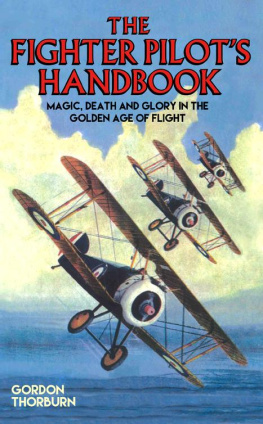
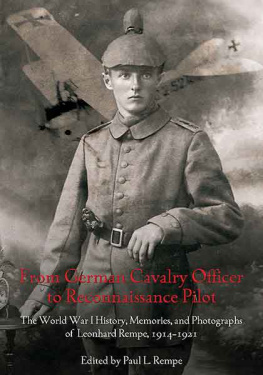
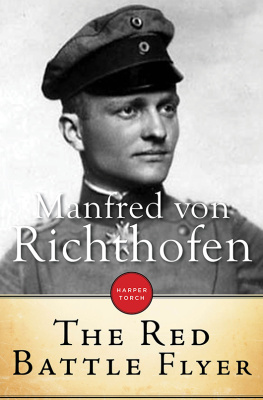
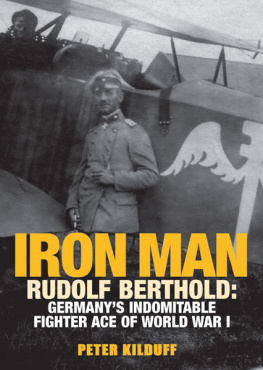
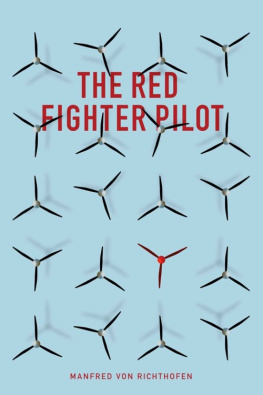
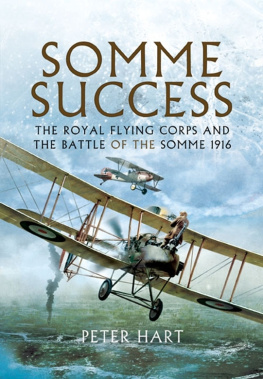


 A Greenhill Book
A Greenhill Book